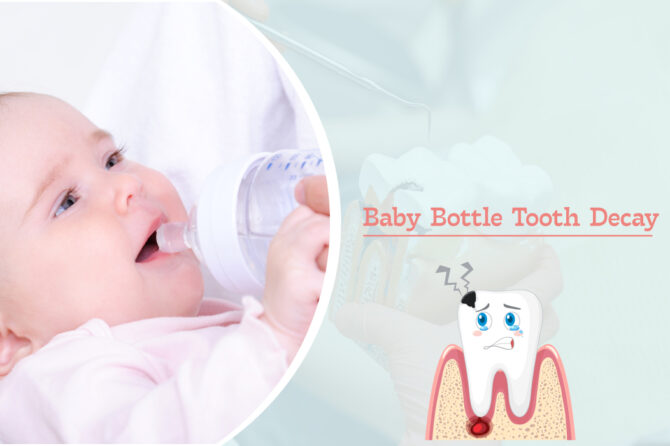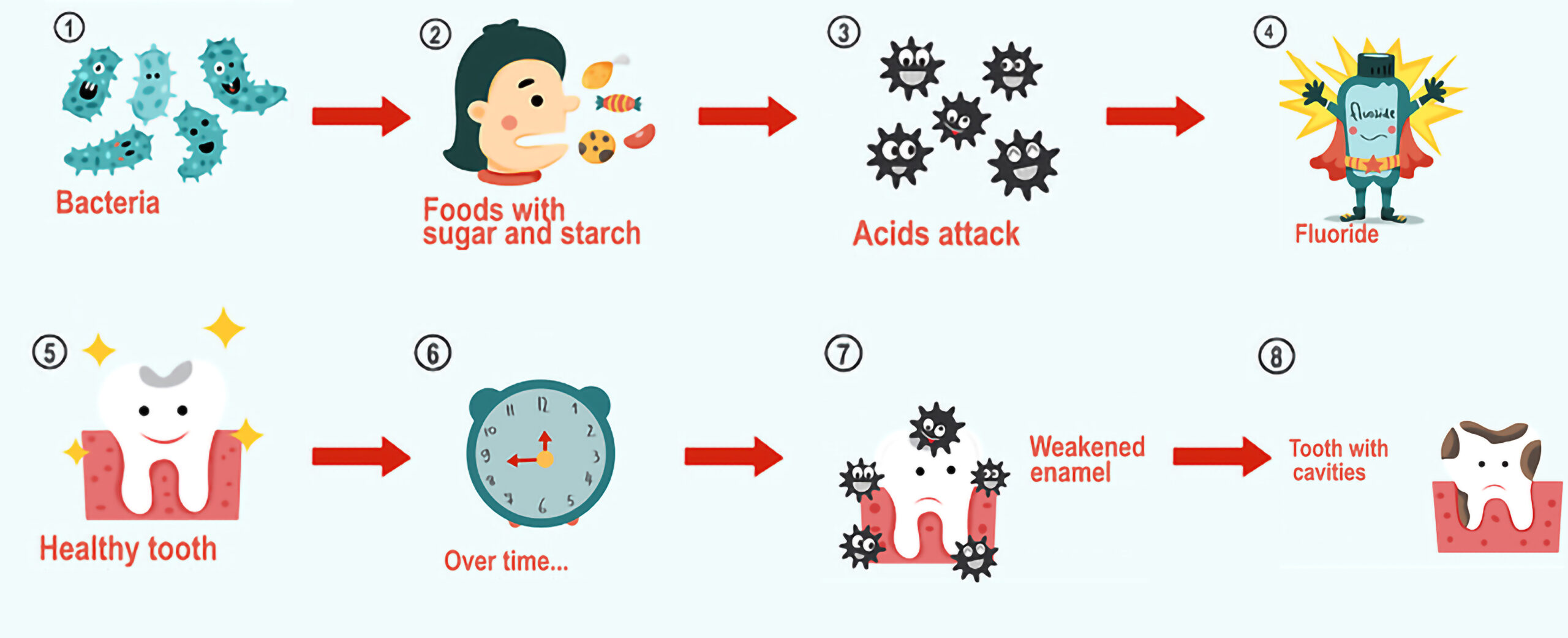
Preventing Baby Bottle Tooth Decay: Tips and Tricks for New Parents
Baby bottle tooth decay, also known as bottle rot, is a type of dental decay that affects the primary (baby) teeth of infants and young children. This condition occurs when the baby’s teeth are frequently exposed to sugary liquids, such as milk, formula, juice, or other sweetened drinks, for prolonged periods of time. When the sugar in these liquids comes into contact with the teeth, it provides fuel for the bacteria that naturally reside in the mouth, producing acid that can erode the enamel of the teeth and cause decay.

If left untreated, baby bottle tooth decay can cause pain, infection, and even the loss of primary teeth, which can impact a child’s bite and speech development and create spaces for adult teeth to come in incorrectly. It is important to avoid giving a child sugary drinks for extended periods of time to prevent baby bottle tooth decay, particularly at night when saliva production decreases, and to encourage them to drink from a cup instead of a bottle when they are old enough to do so.
Causes Of Baby Bottle Tooth Decay
Baby bottle tooth decay is caused by the frequent and prolonged exposure of an infant’s teeth to sugary liquids. Some common causes of baby bottle tooth decay include:
- Infants fall asleep with a bottle containing milk, formula, juice, or other sweetened liquids
- Sipping on sugary liquids throughout the day, such as fruit juice or soda, that pool around the teeth
- Using a bottle as a pacifier allows the child to suck on the bottle for extended periods
- Feeding an infant sweetened liquids, such as fruit juice or soda, in a bottle for an extended period
- Poor oral hygiene, such as not brushing the baby’s teeth or not wiping the gums after feedings
It is important to prevent baby bottle tooth decay by avoiding prolonged and frequent exposure of an infant’s teeth to sugary liquids and establishing a good oral hygiene routine early on.
Symptoms of Baby Tooth Decay
Baby bottle tooth decay, also known as early childhood caries, can be determined by observing the following symptoms in an infant or young child:
- White or brown spots on the teeth: This is the first sign of decay caused by the loss of minerals from the tooth’s surface
- Cavities: As the decay progresses, it can lead to the formation of cavities in the teeth. These cavities can be visible as small holes in the teeth
- Pain or sensitivity: If the decay reaches the tooth’s inner layer, it can cause pain or sensitivity when the child eats or drinks something hot or cold
- Difficulty in eating or drinking: If the decay is severe, it can cause difficulty in eating or drinking, which can lead to malnutrition and other health problems
If you suspect that your child has baby bottle tooth decay, it’s important to take them to a dentist as soon as possible. The dentist will examine the child’s teeth, diagnose the condition, and recommend the appropriate dental treatment. Early treatment can help prevent further damage to the teeth and prevent more serious dental problems from developing in the future.
Treatment of Baby Tooth Decay
Bottle tooth decay, also known as baby bottle tooth decay or early childhood caries, can occur in young children who frequently consume sugary liquids, such as juice or formula, from a bottle. The treatment for bottle tooth decay depends on the severity of the decay. In mild cases, the dentist may recommend improved oral hygiene, such as frequent brushing and flossing, and dietary changes to reduce sugar consumption.

In more severe cases, the dentist may need to perform a dental restoration, such as a filling or crown treatment, to repair the decayed tooth. Some cases, if the tooth is too damaged or infected, it may need to be extracted. Prevention is key in avoiding bottle tooth decay. Parents should avoid putting their child to bed with a bottle or sippy cup filled with sugary liquids and should encourage their child to use a cup as soon as possible. Regular dental checkups and cleanings are also important to maintain good oral health and catch any potential issues early on.
Conclusion
Kids Dental Studio is a specialized dental practice that focuses on providing dental care for children. They offer a range of dental services for infants, children, and adolescents, including preventative care, restorative treatments, and emergency services. One of the key features of Kids Dental Studio is its focus on creating a comfortable and child-friendly environment. The staff is trained to work with children and make them feel at ease during dental visits. The office is often decorated with bright colors, fun designs, and child-friendly themes to create a welcoming atmosphere. Some of the services offered at Kids Dental Studio may include regular checkups and cleanings, fluoride treatments, dental sealants, fillings, extractions, and orthodontic treatment. They may also offer sedation dentistry to help children who are anxious or fearful of dental procedures.
Leave a reply
Leave a reply